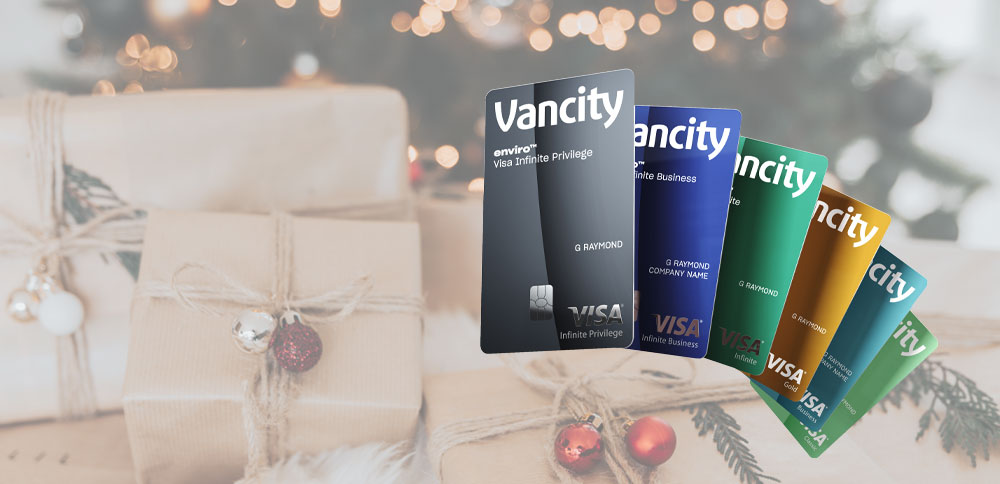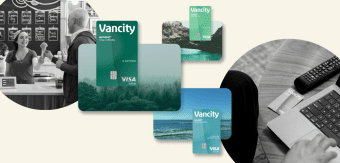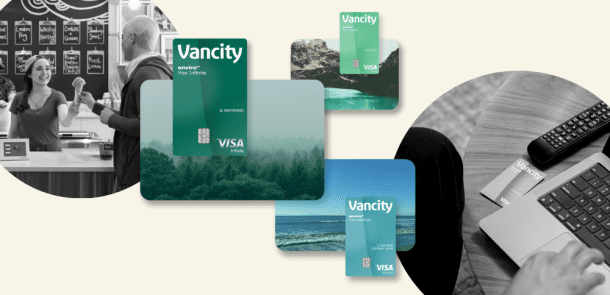Last updated on November 10, 2025.
Oh, the holidays. A time meant to spread joy, goodwill, and… credit card debt? Let’s be real, the financial pressures of gift giving, holiday parties, and travel expenses make it easy to enter the new year in the red. Once you add on rising costs, inflation, and new waves of online scams, it’s tough to see a way through the holidays without overspending.
“The most common mistake I see is treating your credit limit like your budget,” says Alex Chima, a Vancity and Aviso Wealth Planner. “Your credit limit represents what you’re approved to borrow, not what you should spend. Tracking your total spending—even on your phone or a sticky note—helps keep things in check.”
The Bank of Canada says Canadians who carry a credit card balance are more likely to experience financial stress within the following six months than those who pay off their credit card in full. Which makes starting January with a clean credit slate one of the best resolutions you can make.
You don’t need to freeze your credit card in a block of ice to survive the holiday season. You can still give generously, enjoy yourself, and start 2026 off right. The answer lies in being strategic with your credit card, not swearing it off.
The hidden risks of credit card spending in 2025.
The way we spend (and overspend) has evolved. Now you can get gifts delivered to your long-distance loved ones’ homes with the tap of a button. Meaning, it’s easier than ever to end up with a surprisingly large credit card bill.
Here are some hidden causes and overspending risks to be aware of in 2025:
- Inflation and rising costs. Groceries, flights, and even festive coffee drinks are pricier than last year.
- Buy now, pay later (BNPL) temptations. Those split-payment buttons make holiday splurges feel painless, until the instalments come to collect.
- Social pressure. TikTok-worthy gifting and décor can set unrealistic expectations. Your holiday doesn’t need to look like an influencer’s Instagram® feed to be meaningful.
- Impulse buying. The holiday season is full of sales and deals. Before purchasing anything, give yourself 24 hours to think it over.
- Interest rates. Credit card interest rates can be high, especially if you carry a balance. This means that the longer it takes to pay off your credit card bill, the more money you’ll owe in interest.
- High credit utilization rate. Your credit utilization rate is the percentage of your credit limit that you’ve used. High credit utilization rates can make it harder to build a good credit score.
Conrado Braga from Vancity’s Visa marketing team recommends thinking ahead: “Set a holiday budget and stick to it. Use your card wisely by only charging what you can pay off in full each month.”
It’s not just overspending; it’s debt management.
Recent data shows Canadians spending less overall, including on credit cards. But here’s the catch: more of us are carrying over large balances (sometimes 80 per cent of our borrowing limit or more), a number that’s been rising since mid-2020.
In other words, the problem isn’t just what we’re buying;, it’s how we’re managing what we’ve already borrowed. And with new pressures in 2025, even “spending less” can still lead to debt stress in the new year.
These practical debt management moves can help:
- Prioritize payments. Focus on paying down high-interest balances first, even if it means scaling back elsewhere.
- Automate credit card payments. Once you know what you need to pay off each month, set up an automatic payment for the same day you receive your paycheque.
- Set alerts. Most credit cards let you turn on balance or spending notifications so you know when you’re close to your limit.
- Consider balance transfers. If you’re struggling to pay off your credit card bills, consider transferring your balances to a lower-interest-rate card. This can help you save money on interest and make it easier to pay off your debt.
- Make a post-holiday plan. If you do carry a balance into January, set a target to pay it down by spring so it doesn’t snowball into summer. No one wants snow in the summer.
“Try making small payments throughout December instead of waiting for the full bill in January,” says Alex. “It keeps your balance more manageable and reduces that post-holiday statement shock. After the holidays, take a few minutes to review where your money went and identify areas to improve for next year. If you earn cash back rewards or points, using them to pay down your balance can be an easy win.”
“Try making small payments throughout December instead of waiting for the full bill in January.” ~ Alex Chima, Vancity and Aviso Wealth Planner
Smart credit card strategies for the holidays.
A credit card can be a powerful tool if you’re the one in control. Here’s how to keep it working for you:
- Set a holiday budget before you shop. Decide what you can realistically spend on gifts, travel, food, and experiences
,and stick to it. - Use alerts and digital tools. Most cards let you set up text or app alerts for spending limits or large transactions. Automation helps you stop overspending in real
–time. - Lean on your digital wallet. Mobile payments often offer extra layers of fraud protection and help you track purchases more easily.
- Pay more than your credit card’s minimum. Even during the holiday crunch, aim to pay off as much of your balance as possible each month.
- Compare rewards with intentions. Want to put money toward a 2026 vacation? Collect points on your enviro™ Visa card, then redeem for travel or pay your statement balance.
- Be aware of fraud and scams. The Canadian Anti-Fraud Centre warns of sophisticated online scams during the holidays, including some that use legitimate shipping labels. Using a credit card with fraud protection is safer than a debit card, but staying vigilant is key. Here are some other ways you can protect yourself from fraud this holiday season.
Alex suggests treating your credit card like a budgeting tool. “I intentionally lowered my Visa limit to keep myself accountable. Then, I combined that with a prepayment technique, loading funds onto the card so I had money to spend. That way, I could enjoy the rewards and protections while making sure I didn’t overspend.”
Conrado recommends working a buffer into your holiday budget. “When creating your budget, keep a 20 per cent margin for unexpected expenses,” he says. “For example, if your budget is $1,000 for everything, plan to spend only $800 and set aside $200 as a buffer for extra spending. It’s easy to forget something during this busy time, so having that extra margin helps.”
“When creating your budget, keep a 20 per cent margin for unexpected expenses” ~ Conrado Braga, Vancity’s Visa marketing team
How can you use your credit card’s perks to your advantage?
You can make the most out of your credit card rewards and features by using them strategically. Consider redeeming points for gifts, travel expenses, or applying them toward your statement balance. You could also shop at stores that offer additional rewards or discounts for using your credit card.
The best thing you can do is understand what perks your card offers, then use them to your advantage. Some examples are:
- Purchase protection. Many cards cover stolen or damaged items for a set time after purchase. Depending on the coverage, this insurance can cover eligible items if they’re lost, damaged, or stolen.
- Extended warranties. Buying electronics or appliances? Your card might double the manufacturer’s warranty. Check your card to see what’s covered.
- Travel insurance. If you’re flying home or heading somewhere sunny, check whether your card includes coverage.
- Rewards and promos. Vancity enviro Visa cards earn rewards that can be redeemed for travel, gift cards, charity donations, or even applied toward your statement balance, so your spending can give back in more ways than one.
- Low-interest rate card. If you think you might carry a balance, shop with a low-interest-rate card to reduce interest charges.
The Vancity enviro Visa card also offers 2x the points when you book travel through Vancity Rewards. Through Vancity’s Visa Infinite* you’ll also get extra rewards for purchases like groceries, public transit, and shopping at local businesses.
How to be generous without overspending during the holidays.
You can have a generous holiday without overspending by focusing on things like experiences and quality time together.
“It’s easy to feel like generosity means spending more, but the most meaningful gifts often come from thought and intention rather than cost,” says Alex.
Sometimes, the best gifts aren’t things. They’re moments that bring people together. Hosting a potluck or a white elephant exchange can rival an expensive holiday party. Gifting tickets to a local show, community event, or class can make memories that last longer than material things. And it’s more environmentally and community friendly.
When you shop local it keeps dollars in your neighbourhood, reduces unnecessary shipping emissions, and is more sustainable for your community. That’s where Vancity’s values can meet yours. “When you shop local using your enviro Visa card, you can earn rewards while directly supporting small businesses and the environment,” says Conrado. “A portion of profits from every enviro Visa also goes to the Vancity enviroFund™, which funds community and environmental initiatives. So even your holiday shopping can make a positive impact.”
Holiday credit card spending FAQ.
When it comes to holiday spending, using the right card matters. Before you dive into your wallet, consider the following:
How to budget with a credit card?
Use your credit card as a budgeting tool. Set a spending limit based on what you can pay off monthly, and stick to planned purchases. Track spending through your statement, pay the balance in full to avoid interest, and set alerts.
Should I use my credit card for holiday shopping or stick to debit?
Credit cards can be safer than debit for holiday shopping because of fraud protection and purchase coverage. The key is to use your card strategically: set a budget, track your spending, and pay off your balance each month to avoid interest charges.
What’s the best way to avoid overspending during the holidays?
Make a holiday budget before you shop and include everything (gifts, travel, food, even the extra lattes). Use alerts on your card or banking app to keep yourself on track in real time.
What if I can’t pay off my credit card balance in full after the holidays?
Focus on high-interest balances first. Even paying a little more than the minimum each month will reduce the interest you pay and help you get debt-free faster. Set up automatic payments you can afford.
Are BNPL plans a good option?
BNPL can look tempting because payments are spread out, but they can pile up quickly and add stress in the new year. If you use BNPL, track every installment and make sure it fits your budget alongside your other bills.
How can I protect myself from holiday fraud?
Stick to trusted retailers, shop on secure Wi-Fi (not public hotspots), and use your credit card’s built-in protections. Many cards also let you turn on real-time fraud alerts so you can spot unusual activity right away.
How should I use credit card rewards during the holidays?
Use points and apply it to your statement to reduce the financial pressure on things like travel, groceries, and gifts. Choosing a card with rewards that line up with your goals helps.
How do I start 2026 financially strong?
Head into January with a clear plan for any balances you may carry. Setting a target date, like paying down holiday debt by spring, gives you momentum for the rest of the year.
Start the new year strong.
The holidays should be about connection, not credit card statements you dread opening. With the right plan, you can enjoy yourself now and keep 2026 stress-free.
Ready to make your card work harder for you? See how enviro Visa benefits can support your holiday plans.
Mutual funds and other securities are offered through Aviso Wealth, a division of Aviso Financial Inc. The information contained in this article is from sources believed to be reliable; however, we cannot guarantee that it is accurate or complete. This material is not intended to be investment, tax or other advice and should not be relied on without seeking the guidance of a professional to ensure your circumstances are properly considered. Please see our Terms of Use.
enviro™, Carbon Counter™ and Vancity enviroFund™ are trademarks of Vancouver City Savings Credit Union.
* Trademark of Visa Int., used under license.








